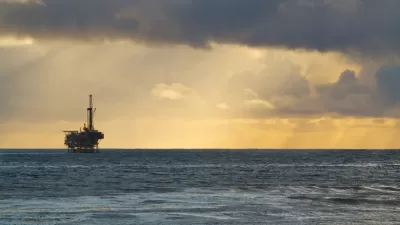In a precedent-setting action that supporters call creative and opponents view as abusive, President Obama has declared a permanent drilling ban off the Atlantic coast from Virginia to Maine and along much of the Alaska coast. But will it last?
"Tuesday’s announcement would ban drilling in about 98 percent of federally owned Arctic waters, or about 115 million acres, a pristine region home to endangered species including polar bears and bowhead whales," writes Coral Davenport, climate and energy reporter for The New York Times. "It would also block drilling off the Atlantic Coast around a series of coral canyons in 3.8 million acres stretching from Norfolk, Va., to the Canadian border."
In January 2105, a mere day after the Interior Department announced it would permanently block drilling in much of the Arctic Refuge, the president agreed to allow drilling in federal waters from Georgia to Virginia, in the Gulf, and some areas off Alaska.
The ban enacted on Dec. 20 invoked "an obscure provision of a 1953 law, the Outer Continental Shelf Lands Act, which [Obama] said gives him the authority to act unilaterally," adds Davenport.
“It’s never been done before,” said Patrick Parenteau, a professor of environmental law at Vermont Law School. “There is no case law on this. It’s uncharted waters.”
"By taking this route, rather than issuing an Executive Order, Obama made it legally difficult for Republican President-elect Donald Trump's administration to reverse this action," reports Steve Horn for EcoWatch.
Opponents view
“We are hopeful the incoming administration will reverse this decision as the nation continues to need a robust strategy for developing offshore and onshore energy,” said Erik Milito with the American Petroleum Institute.
"Fortunately, there is no such thing as a permanent ban, and we look forward to working with the new administration on fulfilling the will of American voters on energy production.”
According to API, "[a] permanent withdrawal conflicts with Congress' stated purpose in creating the Outer Continental Shelf Lands Act (OCSLA), which was to make the outer continental shelf 'available for expeditious and orderly development.'"
"Mr. Obama’s legal experts say they are confident that the ban will withstand legal challenge," adds Davenport. "They point to the specific language of the law: 'The president of the United States may, from time to time, withdraw from disposition any of the unleased lands of the Outer Continental Shelf.'”
Joint action taken with Canada
The president's conservation actions were complemented by those of Prime Minister Justin Trudeau of Canada, who simultaneously announced a review of the federal government's Arctic strategy and agreed to a joint drilling ban with U.S., according to the CBC News. Unlike Obama's ban, though, Trudeau agreed to a review of policy every five years.
In their joint statement, they referenced energy, environmental, and Arctic initiatives the two leaders agreed to in March, each designed to limit climate change and "to strengthen the resilience of Arctic communities and continuing to support the well-being of Arctic residents."
FULL STORY: Obama Bans Drilling in Parts of the Atlantic and the Arctic

Maui's Vacation Rental Debate Turns Ugly
Verbal attacks, misinformation campaigns and fistfights plague a high-stakes debate to convert thousands of vacation rentals into long-term housing.

Planetizen Federal Action Tracker
A weekly monitor of how Trump’s orders and actions are impacting planners and planning in America.

San Francisco Suspends Traffic Calming Amidst Record Deaths
Citing “a challenging fiscal landscape,” the city will cease the program on the heels of 42 traffic deaths, including 24 pedestrians.

Defunct Pittsburgh Power Plant to Become Residential Tower
A decommissioned steam heat plant will be redeveloped into almost 100 affordable housing units.

Trump Prompts Restructuring of Transportation Research Board in “Unprecedented Overreach”
The TRB has eliminated more than half of its committees including those focused on climate, equity, and cities.

Amtrak Rolls Out New Orleans to Alabama “Mardi Gras” Train
The new service will operate morning and evening departures between Mobile and New Orleans.
Urban Design for Planners 1: Software Tools
This six-course series explores essential urban design concepts using open source software and equips planners with the tools they need to participate fully in the urban design process.
Planning for Universal Design
Learn the tools for implementing Universal Design in planning regulations.
Heyer Gruel & Associates PA
JM Goldson LLC
Custer County Colorado
City of Camden Redevelopment Agency
City of Astoria
Transportation Research & Education Center (TREC) at Portland State University
Jefferson Parish Government
Camden Redevelopment Agency
City of Claremont




























